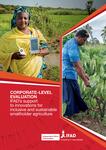Page Header
IFAD's Decentralization Experience
Overview
The Independent Office of Evaluation conducted a corporate-level evaluation of IFAD's decentralization experience in 2016, covering the period from 2003 through mid-2016. The evaluation found that the objectives of the decentralization process were broadly relevant to improve the development effectiveness of IFAD-funded operations. In particular, by bringing IFAD closer to its operation and to the country development context and actors, country presence was expected to improve project and strategy design and implementation support, enhance engagement in non-lending activities, improve alignment with country systems and donor coordination, and contribute towards system-wide coherence of the United Nations. However, IFAD could have learned more from the experience of other organizations and could have been more realistic in its expectations. In particular, the range of activities that country offices were to perform was very broad compared to the resource envelope allocated to them. Moreover, for many years IFAD concentrated on expanding its country presence but paid little attention to re-organizing headquarters. The report also highlighted that by opening country offices, IFAD was in a better position to provide implementation support to its operations. It is through this support that country offices contributed to better project performance and results, especially in terms of impact and gender equality. But the contribution to non-lending activities (e.g. knowledge management, partnership-building and policy dialogue) was mixed. This was partly due to the limited human and financial resource available at the country-office level for non-lending activities. Moreover, engagement in policy dialogue largely depended on relevant interests and experience of individual staff members.Report Details
| Year Published | |
| Type | |
| Joint | No |
| Partner/s | N/A |
| Consultant name | |
| Agency Focal Point | Fabrizio Felloni |
| Focal Point Email | f.felloni@ifad.org |
| Managed by Independent Evaluation Office | Yes |
YOU 'RE READING
IFAD's Decentralization Experience







